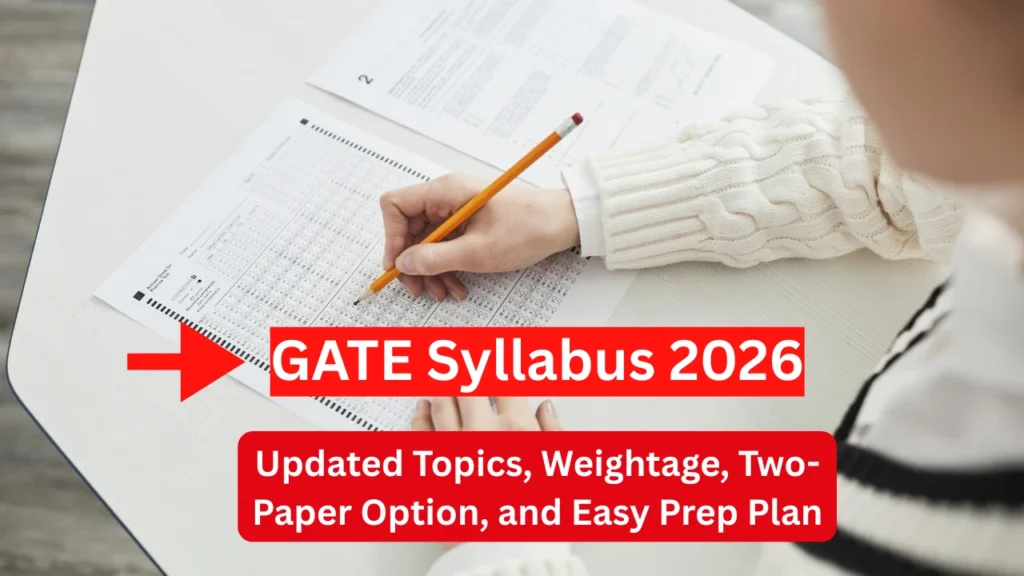The GATE 2026 Syllabus follows a clean structure that suits systematic study. Every candidate faces General Aptitude (GA) and Core Subject questions. Engineering Mathematics appears for most engineering papers, either as a separate part or embedded within the subject section. The paper aims at graduation-level understanding, so clarity of basics and consistent practice bring the best results.
IIT Guwahati conducts the test across 7, 8, 14, and 15 February 2026. The total number of papers stands at 30, with recent cycles adding new options and combinations. Candidates may also choose the two-paper option from approved pairs, which opens wider opportunities for admission and PSU roles.
GATE 2026 Syllabus Topic Wise Details
| Conducting institute | IIT Guwahati (IITG) |
| Exam dates | 7, 8, 14, 15 February 2026 |
| Sections in every paper | General Aptitude, Engineering Mathematics, Core Subject (as applicable) |
| Weightage | GA 15%; Engineering Mathematics commonly included; remaining marks for Core Subject |
| Notable updates | Two-paper option; relaxed eligibility for 3rd-year undergraduates; 30 papers overall with recent additions in prior cycles |
| GA topics | Verbal, Quantitative, Analytical, Spatial Aptitude |
| Sample streams in focus | CSE, Mechanical, Electrical (outline given below) |

What’s new or important in the GATE 2026 Syllabus
- Two-paper option increases flexibility. You select one primary paper and a second paper from permitted combinations to match your strengths.
- Relaxed eligibility allows third-year undergraduates to apply, so serious learners start early and build profile value sooner.
- Weightage clarity helps planning. General Aptitude carries 15%. Engineering Mathematics contributes significantly for most engineering papers. The Core Subject forms the bulk of marks.
- Breadth across 30 papers remains, including recent additions under Engineering Sciences, such as Energy Science (XE-I), and papers like Geomatics Engineering (GE) and Naval Architecture and Marine Engineering (NM) introduced in earlier cycles.
GATE 2026 Syllabus: section-wise view
1) General Aptitude (GA) — 15%
GA checks the reasoning you use across all fields. Strong GA improves your total score quickly because the questions stay concept-driven and time-efficient.
- Verbal Ability: grammar, vocabulary in context, sentence improvement, critical reading
- Quantitative Aptitude: percentages, ratios, averages, time–work, time–distance, permutations and combinations, basic probability
- Analytical Aptitude: data interpretation, patterns, logical deductions
- Spatial Aptitude: visual reasoning, image analysis, shape transformations
How to prepare GA: one short drill daily. Solve 10–15 questions in mixed sets and revise mistakes at the end of the week.
2) Engineering Mathematics
Engineering Maths supports nearly every technical paper. Focus on functions, linear algebra, calculus, differential equations, complex variables, probability, and numerical methods as prescribed for your branch. Treat this as high-return study: even moderate accuracy yields quick marks.
3) Core Subject outlines (quick snapshots)
Computer Science & Engineering (CSE)
- Discrete Mathematics: logic, sets, relations, functions, graphs, combinatorics
- Digital Logic: Boolean algebra, combinational and sequential circuits
- Computer Organization & Architecture: instructions, pipelining, memory hierarchy, I/O
- Programming & Data Structures: C programming, recursion, arrays, lists, heaps, trees, graphs
- Algorithms: sorting, searching, hashing, greedy, DP, divide-and-conquer, MST, shortest paths
- Theory of Computation: automata, CFLs, Turing machines, undecidability
- Compiler Design: lexical analysis, parsing, intermediate code, basic optimisations
- Operating Systems: processes, threads, IPC, deadlock, CPU/I-O scheduling, memory, files
- Databases: E-R model, relational algebra, SQL, normalisation, indexing, transactions
- Networks: OSI/TCP-IP, Ethernet, routing, congestion control, TCP/UDP, sockets, basics of security
Mechanical Engineering (ME)
- Materials, Manufacturing, Industrial: phase diagrams, casting, forming, joining, machining, metrology, CAD/CAM, production planning, OR models
- Applied Mechanics & Design: engineering mechanics, mechanics of materials, theory of machines, vibrations, machine design
- Fluid Mechanics & Thermal Sciences: fluid properties, control-volume analysis, viscous and turbulent flow, heat transfer modes, exchangers, thermodynamic laws and cycles, refrigeration and air-conditioning
Electrical Engineering (EE)
- Circuits: sources, RLC elements, KCL/KVL, network theorems, transient and steady state, three-phase systems
- EM Fields: laws of electrostatics and magnetostatics, Maxwell equations, waves, transmission lines
- Signals & Systems: CT/DT signals, LTI systems, Fourier/Laplace/Z transforms
- Electrical Machines: transformers, DC machines, induction and synchronous machines, characteristics and efficiency
- Power Systems: generation to distribution, line models, fault and load-flow analysis, stability, protection, breakers, harmonics, HVDC/FACTS
- Control Systems: modelling, feedback, Routh/Nyquist/Bode, time/frequency response, root locus, PID, state-space basics
- Measurements: bridges, instrument transformers, meters, oscilloscopes, error analysis
- Analog & Digital: diodes, amplifiers, op-amps, filters, logic gates, K-maps, sequential circuits, converters
- Power Electronics: devices (diode, thyristor, MOSFET, IGBT), rectifiers, DC-DC, inverters, PWM, drives
Use the exact branch-wise list from the official syllabus PDF for detailed sub-topics and limits.
GATE 2026 Syllabus: marks plan and time plan
- General Aptitude (15%) stays your safest first milestone. Daily practice lifts accuracy.
- Engineering Mathematics (commonly 13%–15% in many streams) deserves two short sessions weekly: concept review plus mixed problems.
- Core Subject covers the rest. Split topics into A: high frequency, B: moderate, C: low based on previous cycles’ trends from your notes. Finish A early, interleave B, and keep C for buffer weeks.
Weekly template (example for working students):
- Mon–Thu: 90 minutes Core + 20 minutes GA
- Fri: 60 minutes Engineering Maths + 20 minutes GA
- Sat: 2-hour full-length section test (alternate between Core and GA/Maths)
- Sun: Error log review + formula sheet rewrite
Two-paper option: when it makes sense
Pick a second paper only if the syllabi overlap enough to reuse study effort. Popular pairs often combine an application paper with a fundamentals paper. Keep the second paper light if your college load already runs high. One strong score beats two average scores.
Important dates and documents (quick prep)
- Exam dates: 7, 8, 14, 15 February 2026
- Admit card and city slips: follow the schedule in the official notice
- Documents to keep ready: valid photo ID, passport-size photo, signature, and degree/semester proofs as required during application
How to Read the GATE 2026 Syllabus without getting overwhelmed
- Print the two-page index for your paper and mark familiar vs new topics.
- Start with high-weight fundamentals (circuits, data structures, thermodynamics, etc.).
- Build a one-sheet formula page per subject block; update it weekly.
- Keep an error log with brief notes on every mistake; revisit on Sundays.
- Take time-bound mocks from month two; tune speed and accuracy together.
FAQs
Most engineering papers include General Aptitude, Engineering Mathematics, and the Core Subject. GA always carries 15%.
Yes. Relaxed eligibility allows third-year undergraduates to apply, provided they meet program rules.
You may opt for two papers from approved combinations. Choose a pairing only if there is real syllabus overlap.
The examination runs on 7, 8, 14, and 15 February 2026.
Give daily 15–20 minutes to GA, two focussed maths sessions weekly, and put the rest into Core Subject with topic-wise tests and an error log.
The GATE 2026 Syllabus stays wide yet predictable. GA brings steady marks, Engineering Mathematics supports problem-solving across topics, and the Core Subject drives your final rank. Fix a weekly rhythm, keep a tight error log, and choose the two-paper path only when it truly fits your strengths. Consistent practice converts this map into a strong score. For more details-Click Here
Disclaimer
This summary uses the uploaded GATE 2026 syllabus brief. Exact topics, weightage, and rules follow the official notification. Check the final syllabus and instructions before filling the form or planning exam day.
Click here to learn more

John Michael Ramos is a blogger passionate about Government Schemes, Exams, Automobiles, and Trending News. His aim is to provide simple and authentic information.

